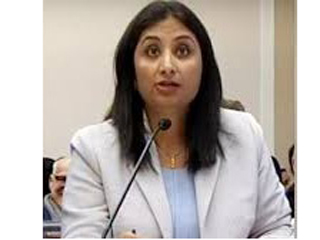
The Government machinery should have taken strict action against jihadi terrorists who displaced 4 lakh Kashmiri Hindus. Hindus expect that the Government at least now take stringent steps and eliminate jihadi terrorism from Kashmir.
Washington (USA) – Arguing passionately that Kashmir is part of a 5000-year Indian civilisation predating Islam and Pakistan, a Kashmir Hindu activist and writer told a US Congressional panel on 14th November that talk of India ‘occupying’ Kashmir was absurd because Kashmir has always been a part of India.
“India is not just a 70-year-old identity, but a 5000-year-old civilisation. There is no India without Kashmir, and no Kashmir without India”, the Houston-based activist Sunanda Vashisht testified at a hearing, challenging the largely Pakistan-driven narrative of the Kashmir issue as a 70-year old religion-specific territorial dispute.
In searing personal testimony, Vashisht also pushed back against the ongoing narrative of Indian oppression and human rights abuse of Kashmiris, asking where were the advocates of human rights when Pakistan-backed terrorists indulged in targeting killing of Hindus in the 1990s and drove 400,000 of them out of the Valley.
“Where was the saviour of humanity when my feeble old grandfather stood with kitchen knives and an old rusted axe ready to kill my mother and I to save us from the much worse fate that awaited us ?” Vashisht asked the Democrat-dominated panel, which heard half-dozen lawmakers and five other witnesses narrate the familiar litany of human rights abuses by Indian forces with barely any acknowledgement of the proven terrorist training and infiltration that has been acknowledged by Pakistani leaders from Pervez Musharraf to Imran Khan.
It was only the second time that the US Congress was hearing the Indian nationalist version of the Kashmir issue that centers on Pakistan’s effort to snatch a region that is civilisational a part of India through terrorist infiltration and instigation of violence. Graphically relating the rape and bloodshed that Pandits had to endure in the pre-social media era before they were driven out, Vashisht told the panel that terrorists trained by Pakistan had caused ‘ISIS level of horror and brutality’ in the Kashmir Valley long before the West was even introduced to the brutalities of radical Islamist terror.
Although outnumbered in what she described as a lop-sided panel with all other witnessing wheeling out stories of ‘human rights abuses in Kashmir’, Vashisht got the opportunity to challenge several bogus assertions that have become part of the Kashmir narrative in the western and liberal circles. Kashmir, she said, was more than the small, narrow, Muslim-dominated Valley that was seeing a Pakistani-terrorist driven insurgency; the people of Jammu and Ladakh, both parts of the erstwhile State, for instance, were happy with the scrapping of Article 370, which itself was conceived as a temporary measure.
She also called out the bluff regarding a plebiscite/referendum frequently pressed for by Pakistani/Kashmiri Muslim/Western commentators, including some of her co-panelists, pointing out that the UN resolutions pertaining to that asked Pakistan to first withdraw from the area of Kashmir it has illegally occupied.
“Good luck with that ! And good luck with getting China to withdraw from the area of Kashmir it has occupied”, she sneered.
Testimony from a slew of other witnesses, including Anurima Bhargava, the Indian-American Commissioner of the US Commission on International Religious Freedom and a civil rights lawyer, centered on the usual litany of complaints about human rights abuses, including some established and acknowledged facts (such as curtailment of communications and the hardships on people) and some hyperbolic accounts, including reports of mass incarceration and genocide promoted by Pakistan.
The lawmakers who dropped in during the hearing were largely sympathetic to the plight of Kashmiri Muslims, and although some of them acknowledged Pakistan’s role in nurturing terrorists (euphemistically called militants) and fomenting unrest, they argued that this could not be an excuse for the Indian state’s heavy-handedness.
Among those who excoriated New Delhi was Indian-American lawmaker Pramila Jayapal, who warned that New Delhi’s action in Kashmir could be ‘harmful to our close and critical relationship’. A Congresswoman from Seattle area who was an Indian citizen for 35 years before she became a US national, Jayapal is one of several liberal lawmakers who sees the Kashmir issue from an ideological and civil liberties perspective that is driving the current narrative about Indian heavy-handedness and human rights abuse.
Asked by the panel what was the way forward to address the issue, Vashisht sought the support of the US and the global community to stop the terrorist insurgency backed by Pakistan. “India’s democratic credentials are unmatched. The country has successfully, in a democratic set-up, defeated insurgencies in Punjab and the north-east. It is time to strengthen India against such insurgencies and the human rights problems will be solved forever”, she told the panel.

 ‘No ban on speaking about Hindu Rashtra, but the Constitution does not permit it’ : Former SC judge
‘No ban on speaking about Hindu Rashtra, but the Constitution does not permit it’ : Former SC judge The Govt has the authority to declare India a ‘Hindu Rashtra’ whenever it desires : Mahant Shankaranand Saraswati, President, Anand Akhara
The Govt has the authority to declare India a ‘Hindu Rashtra’ whenever it desires : Mahant Shankaranand Saraswati, President, Anand Akhara Concept and necessity of the Hindu Rashtra Coordination Committee
Concept and necessity of the Hindu Rashtra Coordination Committee Hindu Janajagruti Samiti pays a courtesy visit to Pt Dhirendra Krishna Shastri, Bageshwar Dham
Hindu Janajagruti Samiti pays a courtesy visit to Pt Dhirendra Krishna Shastri, Bageshwar Dham By 2050 Hindu population will reach 3rd spot in world population
By 2050 Hindu population will reach 3rd spot in world population There is a demand for Hindu Rashtra from across the world : Swami Nischalananda Saraswati Purvanmaya Pith, Puri Shankaracharya
There is a demand for Hindu Rashtra from across the world : Swami Nischalananda Saraswati Purvanmaya Pith, Puri Shankaracharya